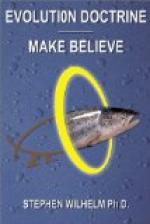The second interpretation is that the two series of events—namely, the physical processes of the brain and the elements of consciousness—are completely independent but entirely parallel. As one writer has put the case, it is as though we had two clocks whose machinery worked at the same rate and whose relationships were such that “one clock would give the proper number of strokes when the hands of the other pointed to the hour.” But in my opinion this attempted explanation of the relation of mind to matter evades the whole question, as it does not account for the dependence of the former upon the latter, but merely assumes the existence of a more ultimate and unknown group of causes for a parallelism in the rates of operation of two series of things regarded as disconnected.
The third conception recommends itself to many on account of its greater simplicity. Formulated as the doctrine of monism, it states that the mind and its material basis are merely different aspects of one and the same thing, and that there is only one series of connected elements which are known to us directly as the current of our thoughts and indirectly as the physiological processes going on mainly in the cerebrum. Thus mind is purely subjective, the brain is only mediately objective. It is because the mental and the material are so intimately related that the monist believes them to be connected as are the lungs and respiration, the hand and grasping, or the eye and the reception of visual impressions from without.
But whichever one of these explanations we choose to adopt as our own, the basic fact of primary importance is that there is an invariable dependence of human thought upon a brain comprising a highly developed cerebrum, whatever may be the ultimate nature of the way mental processes are determined by physical processes, or vice versa. This fact stands unquestioned and unassailable; human faculty and the brain cannot be considered apart, even if they may not actually be different aspects of the same basic “mind-stuff,” as Clifford calls the ultimate dual thing.
Like all of the other organs of lesser importance belonging to the nervous system, the brain is a complex of tissues which in the last analysis are groups of cell-bodies with their fibrous prolongations. When these cellular elements are in operation, mental processes go on; the unit of the mental process therefore is the functioning of a brain-cell. But we know that the substance of a brain-cell is the wonderful physical basis of life called protoplasm, that demanded our attention at the outset. The chemicals that go to make up protoplasm are everywhere carbon, hydrogen, oxygen, and other substances that are exactly the same outside the body as inside. It is the combination of these substances in a peculiar way which makes protoplasm, and it is the combination of their individual properties which in a real even though unknown manner




